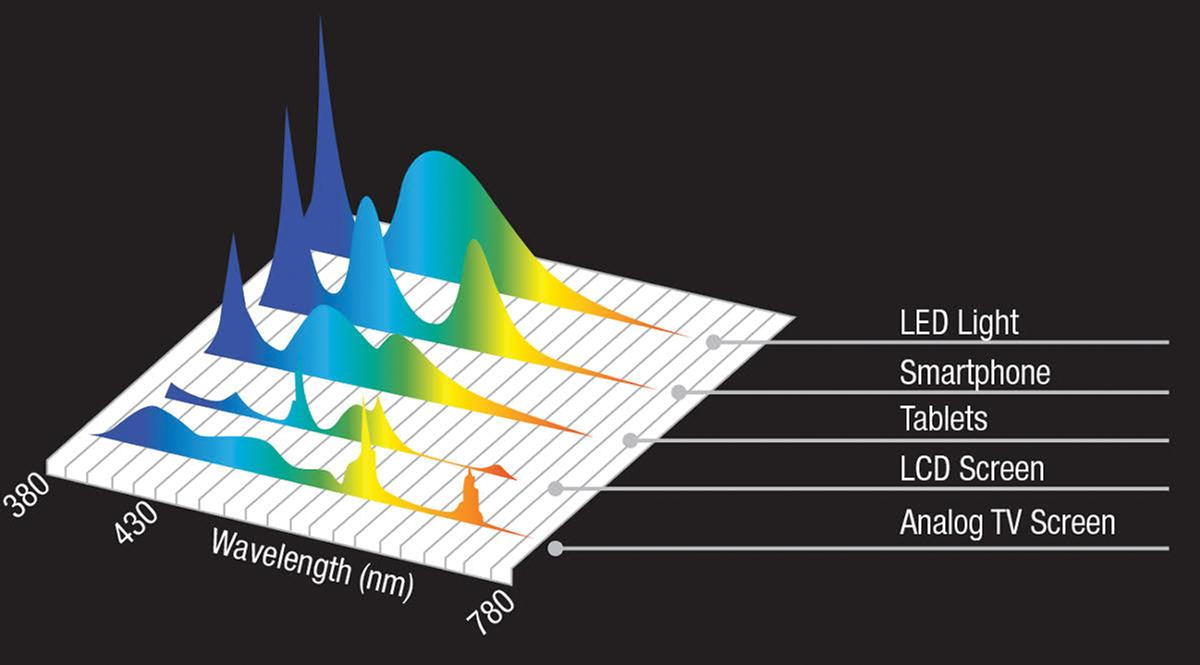
Developmental Concerns
Nevertheless, there is growing evidence that increases in screen time can be harmful to physical, cognitive and social development in children.
As kids spend more time using screens, either for recreation or for school, they spend less time being physically active. A child’s likelihood of being overweight or obese grows as their screen time increases. One study noted the likelihood of being overweight or obese rose as “screen time” increased due to watching TV, playing video games and using a computer as well as that the prevalence of overweight and obesity combined has more than doubled among youth aged 12 to 17 over the last 25 years in Canada.26 Another found watching TV was an independent predictor of the change in the child’s BMI.27 This is a growing concern for pediatricians, as they worry about the secondary effects that obesity will have on the overall health of their patients.
Modern, LED-based screens commonly found on smartphones and tablets contain more short-wavelength light than other wavelengths. Older technologies, such as LCD and analog screens, have less relative blue light than newer technologies. |
Screen use can provide distractions in a learning environment and, in fact, it appears that screen time is associated with attention problems as measured by a teacher’s perception of attention, self-control and impulsivity in the classroom environment. Children who exceed the American Academy of Pediatrics (AAP) recommendations for daily screen use are 1.67 times more likely to have attention problems as reported by their teachers.30 There is also an association between screen time and self-perceived attention issues. In a study of college students, there is a dose-dependent association with screen time use and self-perceived levels of attention problems and hyperactivity.31
There is growing evidence that screen time use is linked with worse psychological well-being. In fact, 14- to 17-year old adolescents who spend seven or more hours per day using screens are two times more likely to be diagnosed with anxiety or depression and are 1.5 times more likely to be diagnosed with anxiety or depression if they spend at least four hours per day using screens.32
Impact on Sleep and Vision
Just because light emitted from the screens of personal electronic devices likely does not damage the eye, it does not mean that it is innocuous. Every day, human beings must entrain their circadian rhythms to the solar cycle. Light detection by the eyes is the principal method of this alignment. So, using screens before bed has the potential to trick the body’s master clock into acting as if it were still daytime. As a result, the complex mechanism of sleep induction is delayed, total sleep time is reduced and rejuvenating rapid eye movement (REM) sleep is compromised.32,37 These effects on sleep have considerable effects on the well-being of patients. Patients who use personal electronic devices before bed often feel more tired the next day and have decreased brain activity compared to patients who do not use them.36
Blink rate is known to drop from about 12 blinks per minute during distance viewing to about six blinks per minute during near work.39 This reduction in blinks can cause the tears to evaporate, leading to a dried out, inflamed ocular surface. Making patients aware of this phenomenon helps assure them that their symptoms are normal. Remind patients to make sure they take breaks to relax their visual system. Providing a reason for their symptoms empowers them to take the necessary steps to address it.
A good place to start is recommending the “20-20-20 rule,” which instructs patients to take a 20-second break to view something 20 feet away every 20 minutes. This approach gives the patient a chance to periodically blink and to relax the binocular vision system. Adding a high-quality artificial tear drop with a lipid component to the 20-20-20 rule may provide addition relief by fortifying the eye’s natural tears to stave off evaporation. Instruct the patient to instill the drop before the start of a long computer session, as they may work better to prevent symptoms than to eliminate them once they have started.
